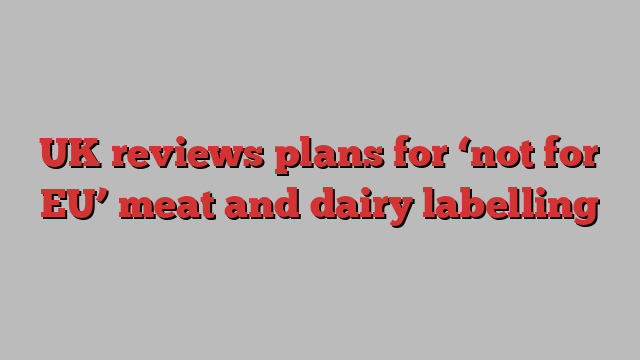
Unlock the Editor’s Digest for free
Roula Khalaf, Editor of the FT, selects her favourite stories in this weekly newsletter.
Ministers are reviewing plans set out by the previous Conservative administration to label meat and dairy products sold across the UK “not for EU” consumption as part of a deal on post-Brexit trading arrangements.
The policy had been part of a package of proposals to implement the Windsor framework, agreed last year to resolve EU and UK differences over the post-Brexit trade rules in Northern Ireland.
The UK government sought to ensure that the same rules applied across both Great Britain and Northern Ireland, but businesses later called for the plan to be scrapped, warning it would lead to much higher costs.
“Ministers are carefully considering the evidence provided in the recent ‘not for EU’ labelling consultation,” said a government spokesperson.
Since last October, businesses in England, Scotland and Wales have had to label meat and some dairy products sent to Northern Ireland as “not for EU” to prevent them being moved on into Ireland or the rest of the EU.
The labelling was due to be extended to all meat and dairy products sold in the UK from October 1 as part of the Tory government’s “Safeguarding the Union”, announced in January, even those not crossing the Irish Sea.
The steps were taken to assuage concerns among Northern Ireland’s unionist community that the region was being treated differently as a result of Brexit, leading to some companies choosing not to supply the region because of bureaucratic barriers.
Jim Allister, MP from the Traditional Unionist Voice, said the imposition of different labelling in Great Britain and Northern Ireland, “actively disrespects the territorial integrity of the UK”.
He added that anything less than requiring the same labels across the whole country would be “unthinkable”.
“Failure to make this demand would further undermine UK (GB — NI) trade,” he said, adding: “I hope that the government will take a longer view, demand the removal of the border and fully re-enfranchise the people of Northern Ireland.”
In the command paper setting out the “Safeguarding the Union” deal, the government said labelling that only applied to goods intended for the Northern Ireland market could create a disincentive for trade.
“The small size of the market means that some suppliers may not have been willing to make the change and may have decided, instead, to remove products from the market,” the paper read.
One industry figure in Northern Ireland said it was unclear how long the pause would remain in force and there was “no word on how the government intends to deliver on ensuring the smooth flow of goods within the UK market”.
The Democratic Unionist Party, the largest pro-UK political grouping in Northern Ireland, declined to comment until details were clearer.
But the news, which was first reported by The Guardian newspaper, was welcomed by the food industry, which has previously warned that the government had not provided sufficient detail about how the system would operate.
The industry also warned that the added complexity of a new labelling regime would weigh on businesses exporting to the EU.
“We’re pleased that the new government has approached this issue with an open mind, there is undoubtedly a problem to be solved that is going to require a bit of flexibility,” said Karen Betts, chief executive of the trade group the Food and Drinks Federation.
Andrew Opie, director of food and sustainability at the British Retail Consortium said the new labelling rules would be “extremely challenging”.
“Without on-pack labelling by the brand owner, the retailer must either undergo full border checks or change their supply chain, both of which add cost and complexity to the movement of goods,” Opie said.